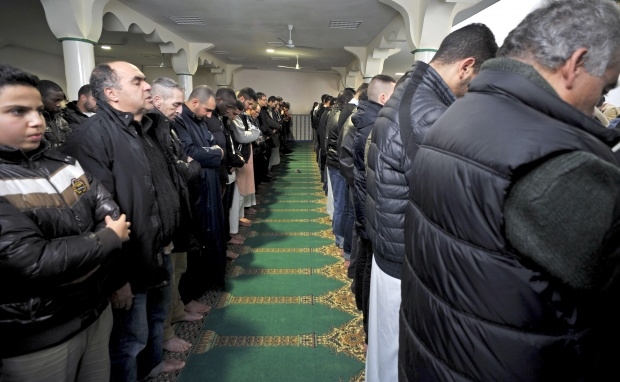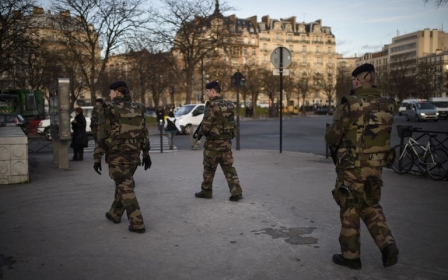ANALYSIS: Does France’s Muslim community really exist?
A recent poll showed that 40 percent of French people believe the presence of a Muslim community is a threat to the country's identity

Photo: Muslims offer Friday prayers at the al-Mouhsinine Mosque in Châteauroux, France, in the wake of the attack on the French satirical newspaper Charlie Hebdo, 9 January 2015 (AFP)
Published date: 13 February 2015 09:30 GMT
|
Last update: 9 years 3 months ago
A Muslim president at the Elysée Palace: If Michel Houllebecq's novel Soumission (Submission), released on 7 January, imagines an “Islamist” party at the head of the French government, the fiction has not yet been matched by reality. As Olivier Roy, professor at the European University Institute and eminent specialist of Islam, wrote: “There is not the shadow of the beginning of the establishment of a Muslim party [in France].”
This observation leads us to examine the concept of the Muslim community itself, so frequently brandished by the media, as well as the politicians’ approach to Islam and France’s Muslims. In its latest study, the National Institute of Demographic Studies said France’s Muslim population, all ages included, represents 4.1 million individuals, a figure which is far below the often heard 5 to 6 million.
Another figment of imagination which is contradicted by the study is that the Muslim community is made up of believers with a homogeneous practice of the faith. If 49 percent of Muslims are strongly religious, 47 percent define their religious practice as moderate, and 4 percent of them, “the cultural Muslims”, have a detached relationship with Islam.
The degree of religiosity varies according to the origin, to the generations, and even according to social status. It is a heterogeneous community, far different from the “monolithic block” mentioned by some. For Hanan Ben Rhouma, editor of Saphir news, an outlet dedicated to the Muslim reality in France, “to believe and to make believe that the Muslim community is made up of members practicing and living their Islam in the same manner is a big mistake.”
Strong internal currents
The journalist insisted: “There is no Muslim community in the strict meaning of the term. It is characterised by its religious, ideological, ethnic, political and social diversity.” Launched in 2002, the website claims 750,000 unique visitors each month, which makes it a media of reference on the subject of Islam in France.
On the ground, the fractured nature of the Muslim community is particularly visible. Steven Duarte, a social scientist with a Masters in Arabic, made this clear. ”In sum, in France, you have the galaxy of the Muslim Brotherhood, embodied by the Union of France’s Islamic Organisations (UOIF). These are conservatives comparable to the Christian Democrats. You have the Tabligh, which comes from India, ultra-conservative but pacifist, which is very present in the suburbs, advocating a strict religious practice without proselytism. Above all, it has contributed to reducing delinquency by bringing the youth back to the mosques. Last, the Salafists, who follow closely Saudi Arabia with an ultra-conservative Islam.”
This eclecticism is hard to unify for the French Council of the Muslim Faith (CFCM). There is a real gap between the Muslim federations, most of which are members of the CFCM (the official authority created in 2003 under then Interior Ministry Nicolas Sarkozy) and the mass of Muslims, explains Ben Rhouma. Bu there is a question over the legitimacy of the CFCM, which is accused of both being absent in the field and of having a promiscuous relationship with the political sphere.
The question of leadership
On the ground, the heads of religious organisations rarely mention the CFCM. The recent attacks in France against Charlie Hebdo showed it clearly. Mohamed, leader of a mosque in the Paris region, had to manage the crisis at his own level. “When the attacks took place, I tried to organise a crisis meeting with the religious leaders of my area,” he said.
His was a personal initiative that did not result from a wider crisis strategy, which should logically have been led by the CFCM. In the absence of leaders, everyone is left to improvise on their own. Also symptomatic of this lack of unified organisation among French Muslims were the sermons heard in mosques during the Friday prayer on 9 January in the immediate aftermath of the attacks. “We all knew that this sermon would be of the utmost importance and that we would have to send a clear message of condemnation of the attacks,” said Mohamed. But whereas all the imams, of course, condemned the attacks, there was no common message.
“In the mosques, all have firmly condemned the use of violence, without necessarily reiterating, for instance, their rejection of the cartoons. Some have advised people to participate in the 11 January march, while others refused categorically,” said Mohamed.
Eventually the CFCM suggested a “common sermon” for the Friday prayers of 16 January, a first in the history of Islam in France.
The positions therefore vary according to the mosques, the imams and the varying trends they form part of. The community is more united by the rite than by ideas. “We can use the notion of community so as not to belittle the notion of Ummah. Yet, this notion encompasses various facets,” explains Mohamed.
This point of view is shared by Omero Marongiu-Perria, specialist in Islam in France and member of the CISMOC research centre at the University of Louvain, Belgium. “I speak of communities in the plural form. The structure of Islam in France is ethnic first of all. Thus, the mosques listed in the territory are distributed according to the country of origin of the first generation immigrants.”
Ethnic organisation
To define a mosque as being Algerian, Moroccan or Turkish is tacitly admitted by the faithful. If this trend is evolving with time, it is not unusual that the faithful attend a specific place of worship according to their cultural affinities with the head of the mosque and the imam. We know, for instance, that some of these clerics are directly sent by the ministries of Religious Affairs in the country of origin.
“It is reported that there are between 100 and 200 Turkish imams, a hundred from Algeria and several dozen from Morocco,” said Marongiu-Pierra. Compared to the 2,500 mosques and prayer halls of France, the proportion is rather low. But it is still way too high for some French faithful. The imams from abroad represent a fault line in ‘France’s Muslim community’.”
This is a situation that Yassin Lamaoui, liberal municipal councillor in Sainte-Geneviève-des-Bois in the Essonne department, and former head of the Muslim association of his town, deplores. “The Islam of France is in the hands of people who do not always master the French social and cultural background,” he said. Even more disturbing, Lamaoui criticises “the consular supervision over the Muslim faith.” For him, it is first an issue of the involvement of French Muslims.
Hanane Karimi, PhD student in sociology and instigator of the feminist movement Women in the Mosque, criticised “the patriarchal procedures but also the impossibility for the youth to identify themselves in the management of the elders.” Structuring a community means being involved in the organisation of the faith, she said. “If the Muslim citizens do not get involved in the management of their faith, nothing will happen. Managing a mosque is a form of commitment in its own right, similar to being elected in a parents’ association at school,” insists Yassin Lamaoui.
Generational rupture
Another stumbling block is the generational issue. During recent years, several local conflicts have erupted between young and old Muslims. The reason? The desire of the younger to appropriate the management of worship and put an end to the paternalism of some local elected officials.
In Saint-Gratien (Val d’Oise), a clash started in 2011 between the Muslim association of the city created in the 1980s and that more recently founded by a handful of young local Muslims. The latter reproached their elders for “being manipulated by the municipality regarding the opening of a prayer hall,” explained one of the protagonists.
If, since then, the situation has calmed down, the generational rupture is a fact recognised in the community. “The eldest failed to hand over to the young French. The Islam of France is always in the hands of the first generation immigrants,” noted Marongiu-Perria.
Although seemingly an unavoidable phase, this situation is slowly being forced to change. For the sociologist Marongiu-Perria, “it is urgent that the Muslim French develop a French look at Islam.” He points at the ongoing alienation from French culture within some groups, like the Tabligh movement. “Instead of an acculturation into French culture, there is a trend to arabisation, which is visible in the clothing or even the choice of the mosques’ names.”
Translation from French (link).
Stay informed with MEE's newsletters
Sign up to get the latest alerts, insights and analysis, starting with Turkey Unpacked
Middle East Eye delivers independent and unrivalled coverage and analysis of the Middle East, North Africa and beyond. To learn more about republishing this content and the associated fees, please fill out this form. More about MEE can be found here.



